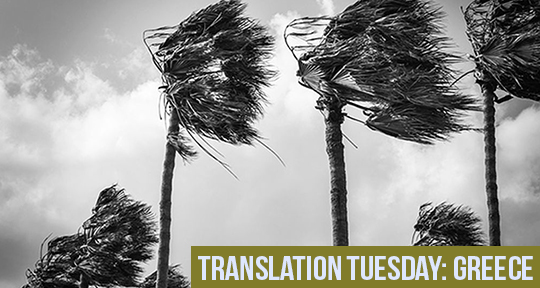Epilogue Wind
Each time an act ends
humans feel the need
to write an epilogue
on paper or in the heart.
What was created by the mind
like lightening wants to shine
in the heaven of creation, to last
even if only in one small corner of history.
I find myself at that time of life
where I should “epilogue”
but I feel my past disappear
leaving only faint tastes and images
with no explanation.
The wind is there, though,
sometimes wild, sometimes cool,
carrying with it storms or calm.
Yes, the wind is the right epilogue
to a complete life
which, of course, when asked why
has no answer.
With Other Eyes
The time came to see my life
with other eyes like a memory
left behind while searching for eternal emptiness,
frantic not to miss a sign I might interpret
from my dreams. Now I see reality
naked, without imaginary or real faces,
without love, life’s spring, youth,
without the enthusiasm for every little creative act.
If I take down all the decorations
from the old reality
will I get closer to the truth?
But how to conceive of truth
if it isn’t full of living air?
No answer there. I sink into the night
and try again.
Translated from the Greek by Karen Van Dyck

Katerina Anghelaki-Rooke was born in Athens, Greece, and died January 20th, 2020 at the age of 81. She is the author of more than twenty books of poetry and numerous translations (Pushkin, Plath, Heaney). Her own work has been translated into more than a dozen languages. She won the Greek National Prize for Poetry (1985) and the Greek Academy’s Poetry Prize (2000). Her home was on the island of Aegina.
Karen Van Dyck is the Kimon A. Doukas Professor of Modern Greek Literature in the Classics Department at Columbia University. Her translations include The Scattered Papers of Penelope, an edited collection of the poetry of Katerina Anghelaki-Rooke (Graywolf 2009), Austerity Measures: The New Greek Poetry (NYRB 2017, winner of the London Hellenic Prize), and Margarita Liberaki’s novel Three Summers (NYRB 2019).
*****
Read more translations on the Asymptote blog:

